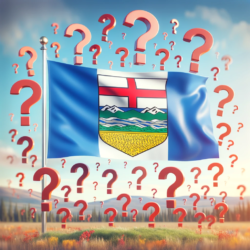Yes, Alberta is home to fleas despite its harsh winters. These resilient pests can survive extreme temperatures and go for long periods without food. Their presence underscores the need for

What Is Required to Register a Vehicle in Alberta?What Is Required to Register a Vehicle in Alberta?
Registering a vehicle in Alberta is a straightforward process, ensuring that vehicles on public roadways have valid insurance and a Vehicle Registration Certificate. This process is essential for both motor

What is The Regulated Rate Option (RRO) in Alberta?What is The Regulated Rate Option (RRO) in Alberta?
The Regulated Rate Option (RRO) in Alberta is a default electricity pricing plan available to residential, farm, irrigation, and small commercial customers who consume less than 250,000 kilowatt hours per

What Is Science 30 in Alberta?What Is Science 30 in Alberta?
Science 30 in Alberta is the culmination of the high school science curriculum, offering students a comprehensive exploration of scientific concepts across various disciplines. This course is designed to sharpen

What Is Special Chambers in Alberta?What Is Special Chambers in Alberta?
Special Chambers in Alberta serves as a critical court process for addressing complex legal issues that require more detailed discussion than what’s possible in Regular Chambers. This procedure is essential
What Is Stress Leave in Alberta?What Is Stress Leave in Alberta?
In Alberta, stress leave, officially termed as long-term illness and injury leave, empowers employees to take necessary time off for health issues, including stress, ensuring they don’t lose their job

What Is Spousal Support in Alberta?What Is Spousal Support in Alberta?
Spousal support in Alberta is financial assistance paid by one ex-partner to the other after a separation or divorce, aimed at mitigating economic disparities resulting from the end of the

What Is Tenant Insurance in Alberta?What Is Tenant Insurance in Alberta?
Tenant insurance in Alberta, commonly known as renters’ insurance, is an essential form of protection for individuals renting their homes. This insurance covers personal property within the rental unit, liability,

What Was the Advanced Road Test in Alberta?What Was the Advanced Road Test in Alberta?
The Advanced Road Test in Alberta was a critical component of the province’s Graduated Driver Licensing (GDL) program, designed to assess the driving skills of individuals seeking to graduate from

What is the Alberta Family Employment Tax Credit?What is the Alberta Family Employment Tax Credit?
The Alberta Family Employment Tax Credit (AFETC) is a cornerstone of financial support for lower and middle-income working families in Alberta. Designed to help these families provide for their children,

